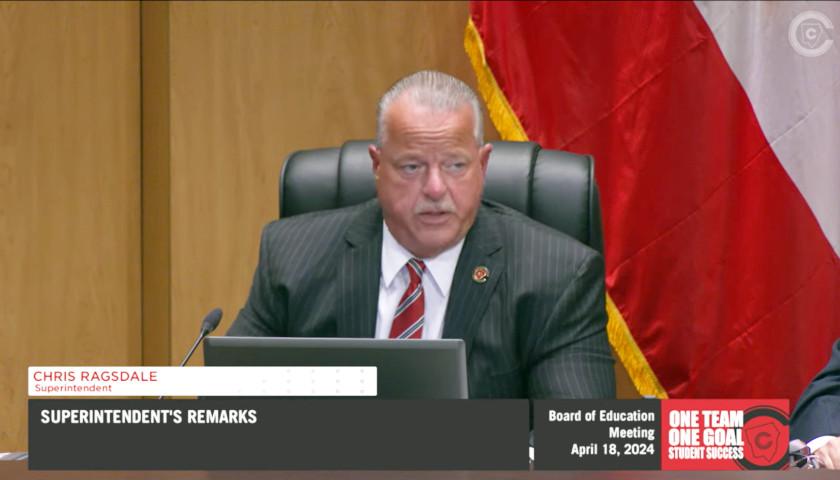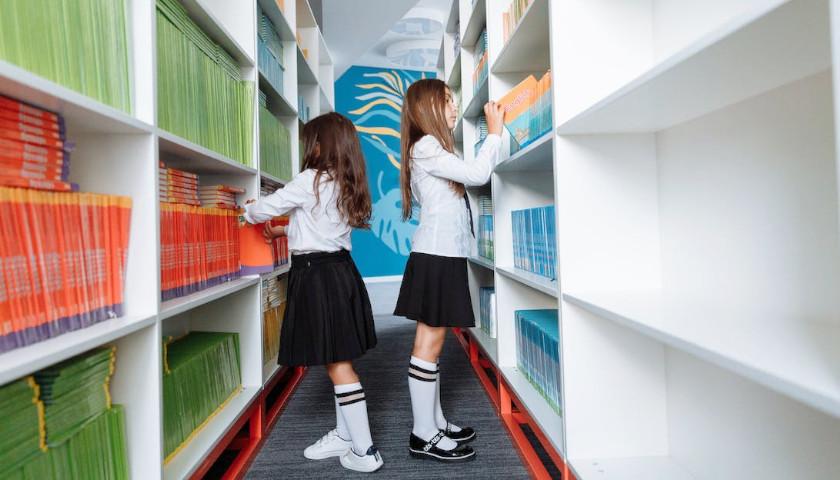Cobb County School District (CCSD) Superintendent Chris Ragsdale announced the removal of four books containing “lewd, “vulgar,” and “sexually explicit” content from school media centers in a Board of Education meeting Thursday.
“Tonight, I am announcing that four additional books are being removed after having gone through our very thorough district process: ‘It Ends with Us,’ ‘The Perks of Being a Wallflower,’ ‘Lucky,’ and ‘Thirteen Reasons Why.’ The review found all four of these books to contain lewd, vulgar, and sexually explicit and graphic content inappropriate for a public school,” Superintendent Ragsdale said during the meeting.
The move comes after the district took the books “Flamer” and “Me Earl and the Dying Girl,” which Ragsdale described as “rife with graphic sexual content” that “involved children” off school library shelves in August 2023.
Ragsdale (pictured above) “disagreed with the term “book banning” and told board meeting attendees, “What we are doing is not forcing taxpayers to fund students having unrestricted access to materials that are so sexually explicit and graphic they could not be read aloud in this very board meeting without violating FCC regulations.”
The superintendent also aimed to reassure parents.
“What we are doing is giving parents peace of mind in knowing their children will not have unrestricted access to this content while at a Cobb County school,” he said.
“[P]rotecting children from age-inappropriate and graphically sexually explicit material is a battle between good and evil,” Ragsdale added.
The superintendent also pointed out that the majority of people supporting children’s access to explicit books in schools are activists, not teachers.
Not everyone within CCSD agrees with the superintendent. During public comments before the meeting, a CCSD member told the board, “I wish you would end your assault on media specialists and allow them to do their jobs…quit trying to ban books in their libraries.”
The American Library Association (ALA) has also fought to keep inappropriate books in schools, even going so far as to help craft legislation to promote student access.
Referring to any attempts to curb student exposure to inappropriate books as “censorship,” ALA’s recent kick-off of National Library Week included a list of the “10 Most Challenged Books of 2023,” three of which Cobb County is banning for overtly sexual content.
Left-wing teacher organizations like the National Education Association (NEA) also call removing explicit books “censorship.” The NEA stated in a post on X in early April, “All students deserve the freedom to read. But, between 2022 and 2023, there were 3,300+ attempts to ban books in public school classrooms. Despite growing censorship, educators are using organizing and legislation to fight back.”
Similarly, American Federation of Teachers (AFT) President Randi Weingarten argued in an X post in March 2023, “Let’s be 100% clear. Book bans are attacks on freedom. It’s an attack on the freedom to read and the freedom to learn. That’s why parents, students, educators and communities are rejecting book bans every chance they get.”
However, parental rights groups favor removing hypersexualized content from schools. The Moms for Liberty organization has a Moms for Libraries program to help get wholesome books that teach American values into school libraries.
– – –
Debra McClure is a reporter at The Georgia Star News and The Star News Network. Follow Debra on X / Twitter




